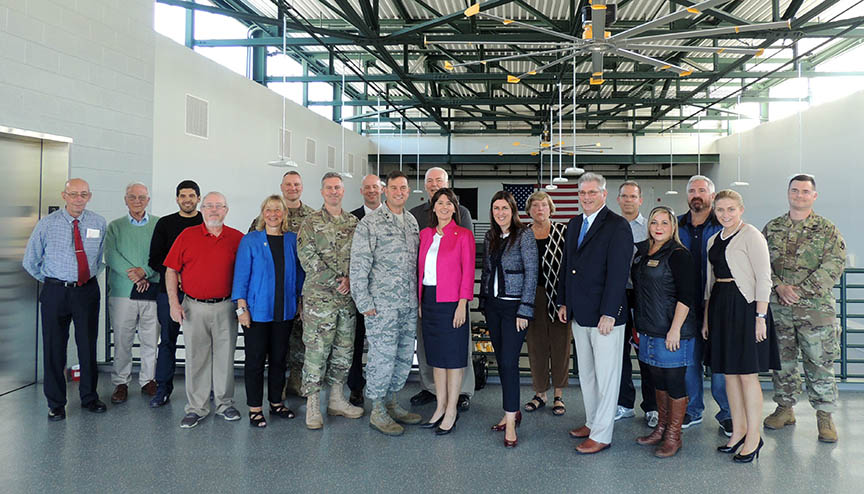Last month, members of the Metrowest Veterans Consortium toured the Natick Readiness Center of the Massachusetts National Guard. They were welcomed to the facility, opened in 2014, by Major General Gary Keefe, the Adjutant General of the Massachusetts National Guard.
What is the Metrowest Veterans Consortium?
Representative Carolyn Dykema (D-Holliston) actually founded the Metrowest Veterans Consortium in April of 2012 to bring together leaders in the Veterans community to share experiences and successes as well as highlight needs and concerns of veterans in the Metrowest area. Local veterans and veterans’ advocates can receive up-to-date information and build consensus and support for initiatives that support local veterans.
“This all started with my own education about veterans’ issues,” says Rep. Dykema. “I have not served in the military, but I was assigned to the Committee on Veterans’ Affairs. It was an eye-opening experience for me on the number of vets in our community, of all generations. There are WWII vets getting older, a whole generation of Vietnam veterans who are aging and had a certain set of experiences and special needs, and we’ve got this new generation of vets from the Afghanistan and Iraq wars, a completely different group, that not only has a new set of needs, but also receives information in a different way.”
Dykema says she wanted to connect “the needs of the veterans in her community with what the state was working on to support them.” As she networked, she met more vets in the greater Metrowest area, such as Ed Carr, of Natick, who suggested connecting veterans’ services officers, veterans’ advocacy groups, local veterans and legislators.
“In those 19 communities invited to participate, any group regionally that touches our local vets has participated in (the consortium),” says Dykema. The group meets quarterly, and notices are sent out via a type of listserv.
Some of the things the Metrowest Veterans Consortium has helped facilitate in recent years includes:
• An earmark a few years ago (although it did not get recent funding) at Framingham State University for a paid internship program for veterans at the school.
“We have a very active veterans group we connect with,” says Dykema, “but because vets tend to be older and have financial commitments, they were being torn between taking internships and part-time jobs to pay the bills, and foregoing some of the internships that might be better in the long term... it was a very popular program, and we were disappointed we didn’t get (recent) funding for it to continue.”
• A few years ago, she explains, the Metrowest Veterans Consortium was able to advocate for changes to local court in Framingham to the benefit of veterans.
“About 20 veterans a day commit suicide,” says Dykema. “These vets, they come home – they’re helpers by nature, that’s why they serve, but sometimes it’s hard to be helped. They come home with these challenges, service or combat related, and a lot of them have undiagnosed PTSD, and they don’t’ reach out for help. A traditional way to cope is things like substance use. You see a growing use, which leads to things like OUIs or other things that could bring you into court system.”
The Valor Act Dykema helped to pass offers “a session of Framingham District Court reserved only for veterans. It’s a supported structure. Vets have to complete certain requirements of this program that get them on their feet, rather than have them have a criminal record.”
Dykema sees the Metrowest Veterans Consortium as “a community, more of a network. One of things you quickly find out when you work with veteran community – anytime you can have vets connecting, or mentoring other vets, it really improves the effectiveness,” she says. Anyone in that consortium can call on that group of resources.”
As day-to-day examples of relationships that she’s been able to build through the consortium, the legislator points to an event in which local students in the public service program Project 351 are working with Steve Bradford, of the Holliston American Legion, to write letters to veterans. “We were able to pair them up with the folks over at the Timothy Daniels House,” says Dykema.
“One other things we did locally was connected with Mass. Fallen Heroes, Afghanistan and Iraq veterans’ families. We worked with Steve to bring them out to Holliston so the community could come and see the moving memorial.”
Dykema is also excited about a new Veterans Counseling Office that opened up in Holliston in August at the Holliston Town Office, 1750 Washington Street. The Holliston site is the newest Community Access Point offered through the Worcester Vet Center, and offers free and confidential counseling services to eligible veterans and their families. The CAP is open Mondays and Thursdays by appointment, and you can find out more at (508) 753-7902.
“It’s free and confidential counseling, a satellite CAP (Community Access Point) offered through the Worcester Vet Center.”
Dykema points out that the group is evolving, with communication tending to be the biggest challenge.
“Years ago, you’d go to a physical place, but younger vets get information very differently. We find younger vets get their information via Facebook and social media, and it’s challenging to reach them, because they’re very decentralized … Communication at large is the project. How do we disseminate information so that people are aware? That’s where the consortium can add value. It’s a network to share information.”
The Metrowest Veterans Consortium, says Dykema, has an extensive email distribution list through which it disseminates information about events. If you are a veteran and would like to have your email added to that list, call (617) 722-2680.

Issue Date:
November, 2017
Article Body:
